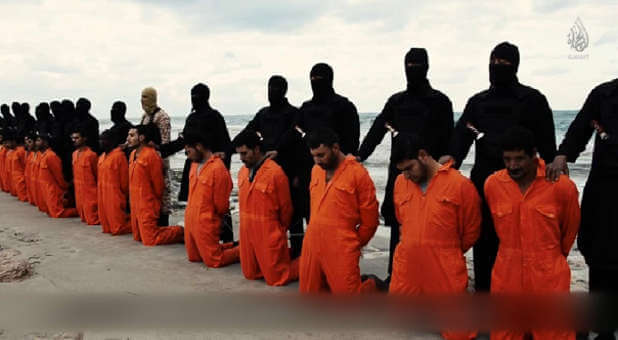Last Sunday in Libya, masked militants linked to the ISIS terrorist group led 21 Egyptian Christian men to the Mediterranean shore and made them kneel. Then the Islamic jihadis took out knives and cut each man’s head off.
As blood mixed with salt water to create a grisly red tide, one of the militants issued a threat to all Westerners: “We will fight you all together. The sea you have hidden Sheikh Osama Bin Laden’s body in, we swear to Allah we will mix it with your blood.”
A recent wave of Islamic beheadings—videotaped and posted online—has reminded the world that ISIS and other ultra-violent Muslim groups are not going away. In 2014 ISIS warriors beheaded Syrian and Lebanese soldiers, American journalists, Japanese Christian journalist Kenji Goto, humanitarian aid workers and even children of Christian families. And now their terror has spread far beyond Syria.
The terrorists claim to be carrying out the will of Allah, and they cite a passage in the Quran (47:4) to justify their brutality: “Therefore, when ye meet the unbelievers [in fight], smite at their necks.” More peaceful Muslims have condemned the extreme behavior of ISIS, but this has not convinced the West that we aren’t in danger of worse violence.
The stream of blood we saw in 2014 may become a river this year. And Christians in the Middle East are the most vulnerable.
So what can we do? Military action will likely become necessary, especially if the terror hits our shores. But before suicide bombers attack Dallas or people are beheaded in the streets of Pittsburgh, the Christian community must wake up to the need for emergency prayer. Here are six biblical ways you can pray:
1. Pray for a bold witness of the gospel in the midst of persecution. Persecution was a reality in the New Testament church, but it did not stop the early disciples from spreading the gospel. After Peter and John were arrested and told to stop preaching, they announced: “We cannot stop speaking about what we have seen and heard” (Acts 4:20). Pray that persecuted Christians will not be intimidated or silenced by acts of terror.
2. Pray for supernatural miracles to confirm the gospel. When the early church faced opposition, they prayed not only for boldness but also for a display of God’s power. They prayed in unity in Acts 4:29-30: “And now, Lord, take note of their threats, and grant that your bond-servants may speak your word with all confidence, while You extend Your hand to heal, and signs and wonders take place through the name of your holy servant Jesus.” Pray that God will bare His arm and show the world that He is real, especially to militant Muslims who don’t know the Savior.
3. Pray that the seed of the martyrs will produce a harvest of converts. When an angry crowd stoned Stephen, the first martyr of the early church, he cried out on his knees: “Lord, do not hold this sin against them!” (Acts 7:60). His death was tragic, but it was not in vain. A great outpouring of the Holy Spirit followed his martyrdom. When a born-again Christian gives his or her life for Jesus, God takes note and responds. This could be the greatest hour of spiritual awakening in the Middle East.
4. Pray for heavy conviction to fall on those who persecute the church. Saul was bent on arresting and killing the early disciples, and he watched as Stephen was martyred. Yet shortly after Saul launched his terror campaign, he fell on his face on the Damascus road and was dramatically converted (see Acts 9:3-4). This same miracle can happen today to leaders of ISIS. Don’t limit God’s power—and don’t pray vindictive prayers of judgment on these people. Pray that the most militant persecutors of the church will have a head-on collision with the Son of God.
5. Pray for angelic protection and intervention. During one wave of persecution against the New Testament church, an angel appeared in Peter’s prison cell, woke him up and caused his chains to fall off (see Acts 12:7). Later, after King Herod refused to stop his rule of terror, an angel struck him dead (see 12:23). The Bible does not say the church prayed for Herod’s death; we should never pray with a vengeful spirit, but we should leave room for the wrath of God when mercy runs out.
6. Pray that the global Christian community will work for peace and justice in the Middle East. We cannot just sit back and watch our brothers and sisters being beheaded for their faith while we enjoy our First World comforts. We must be in solidarity with them, not only in prayer but also in action. We should actively support government and church leaders who are working behind the scenes for reconciliation, humanitarian aid and protection for the victims of injustice.
Our response to this wave of terror cannot be fear—or hatred. Don’t just curse the darkness. Be proactive by praying fervently. Ask God to unleash in the Middle East a great outpouring of the Holy Spirit that will not only bring peace-loving Muslims to Christ, but also bloodthirsty Islamic militants who are sharpening their knives for the next attack.
J. Lee Grady is the former editor of Charisma. You can follow him on Twitter @leegrady. He is the author of several books including his latest, The Truth Sets Women Free (Charisma House.) You can learn more about his ministry, The Mordecai Project, at themordecaiproject.org.












